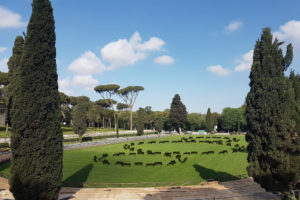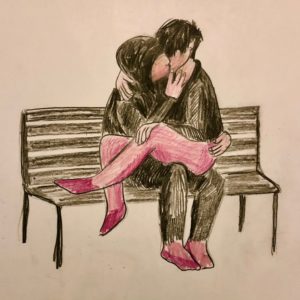To start a process of raising awareness of the public good based on the concepts of community, responsibility, respect and sustainability: this is one of the objectives of 100 panchine per Roma (100 benches for Rome), an artistic project born in the context of the Rebirth Forum Roma 2019 and developed by Cittadellarte. Through an operation of direct fundraising, the initiative intends to activate Rome’s social fabric to ‘adopt’ 100 benches made of recycled and recyclable plastic, to create two temporary installations of Michelangelo Pistoletto’s Third Paradise in 2021 and to carry out an educational programme with local schools and associations thanks to the donation of the benches to the City of Rome. Two temporary installations composed of the hundred benches will also participate in the Festival delle Periferie (Festival of the suburbs), organised by Giorgio de Finis in the VI Municipio, in the area of the Gabi Archaeological Park (the exact place still being agreed between the Municipio, Rome’s Superintendence and the Tor Vergata University), and in the event Back to Nature, curated by Costantino D’Orazio in Piazza di Siena at Villa Borghese. As mentioned, when the installations are removed the benches will be officially donated to the City of Rome, which will distribute them on the territory.

Rendering – Piazza di Siena.
The project is therefore structured in different phases: the adoption and dedication of each bench, the participation in the installations, the donation to the City of Rome and the programme of workshops of civic education and active citizenship with local schools and associations in the course of the 2021/22 school year. An initiative not only aiming at complementing Rome’s urban furniture, but at involving private citizens in the public initiative, promoting the concept of participation, raising awareness of the importance of the encounter and of the respect for nature and others, presenting the demopratic process and facilitating a conceptual relaunch of the territory.
How can you help finance the project? Making a bank transfer of 500€ to Fondazione Pistoletto Onlus, which is acting as guarantor for the project (see the details at the bottom of the article). It is not a sale, but an artistic adoption with direct impact on society. The adopted bench can then be personalised with the name of the donor and a message/dedication of 150 characters that will be inscribed at the location. Not only that: if the donor is an association, a company, a public or private organisation, they will be able to include their QR code of reference in the inscription. Each adoption will guarantee that the name of the donor and, if requested, a dedication will appear on the website, where they will be able to follow all the updates on the life of each bench; donors will also receive the catalogue of the project and have the opportunity to buy lottery tickets at the symbolic price of a 1€ each to enter the competition to win the 101st bench.

Image by Giada Fedeli.
Is this the only way to contribute? No, it isn’t. A certain number of shared ‘community’ benches has been reserved, which can be participated in by donating any amount with a bank transfer, by credit card or through Paypal on the crowdfunding platform Produzioni dal Basso, clicking here.
The spokesperson for the project Francesco Saverio Teruzzi introduced us to the details of the initiative, starting from its outset: “100 panchine per Roma was conceived in the context of the Rebirth Forum Roma revisiting a previously abandoned idea. Back in 2018, we already wanted to carry out a project widely involving Rome with Nicoletta Ramella Susta, who is actually from the Biella area. Conditions at the time were not ideal so the concept was presented again at Rome’s tables of Demopratic Work. Let’s say that only the incipit of the original idea was retained and, as Demopraxy teaches us, the discussion, the debate, the contribution of ideas and experiences led to the final project now coming to life. Meeting Giorgio de Finis and Costantino D’Orazio, as well as the participation of the VI Municipio in the Rebirth Forum, has definitely brought contents to 100 panchine per Roma. But behind the scenes there is also a team of partners who have collaborated in the development of the project (in alphabetical order: Artivazione, Associazione Amici del Tevere, Civitan International Roma, Decano Viaggi, Galleria Continua, Galleria Mucciaccia, IILA – International Italian-Latin American Organisation, M’AMA.ART, M’AMA.SEEDS, Osservatorio Socialis, RAM radioartemobile, RIF Museum of the suburbs, Zerynthia – Association for Contemporary Art)”.

Rebirth/Third Paradise ambassadress Laura Salas.
Why benches and why of recycled plastic?
“And recyclable, I always add! The bench is a symbol of resilience, a word that is often mentioned nowadays given the period we are going through. But the bench is also a place where to socialise, to breathe, an observation point where to gather new energy and, if we want, also escape our daily routine. In this sense, it is also anti-consumerist”.
What can you tell us about the composition of the benches?
“I will be brief and on point: the Rome model of the benches is made exclusively with 100% recycled post-consumer material coming from differentiated waste collection, with the exclusion of industrial plastics and organic matter (sawdust). The materials used are certified PSV (“second life plastic” from differentiated waste collection) by the IPPR in Milan, with a report deposited with Milan’s Tribunal. The benches are certified UNI 11306:2009 ‘Benches – safety requirements and testing methods’. The use of recycled plastic saves the emission of 85.5 kg of CO2 per bench, which is extremely important”.
Did we need a project like this in a historical period like the present one?
“Absolutely, obviously within the limits of how much or how little people might like the project. But to all intents and purposes it is even more valuable today, when a reactivation is in progress and we are looking to the future well aware of what the present is and, partly, of some weaknesses from our recent past in which a higher sense of the other and of the community, together with the adoption of few simple rules would have made a difference. It is an action born among private citizens, which makes itself explicit becoming public though and, in fact, concerns the polis”.
“The initiative 100 panchine per Roma – added Michelangelo Pistoletto – came alive at Rome’s Rebirth Forum. A chair can be occupied by one person only, a chair is therefore not democratic. A bench can accommodate more than one person therefore is democratic. The word ‘democracy’ comes from the Greek ‘demos’ (people) and ‘cratos’ (power), i.e. power of the people. But the people is made of many individuals who, if separated from one another, cannot exercise power. How do individuals get together in order for the people to be able to exercise power? Through the art of Demopraxy, where the term ‘practice’ (praxis in Greek) replaces the term ‘cratos’ (power). We have noticed that, in fact, people are already brought together by the organisations that compose society itself: companies, associations, public and private bodies, consortiums, clubs, work groups, each of which already constitutes a mini-parliament, i.e. a small government, in which decisions that concretely affect society’s actual life are constantly taken. These organisations, gathered in the Rebirth Forum, can build the Demopraxy. Each bench – concluded the Biellese artist – represents one of these organisations which, united under the banner of the trinamic symbol of regeneration, come to symbolise the Demopratic process. This constitutes the achievement of a dynamic balance between private and public that regenerates the whole society”.

